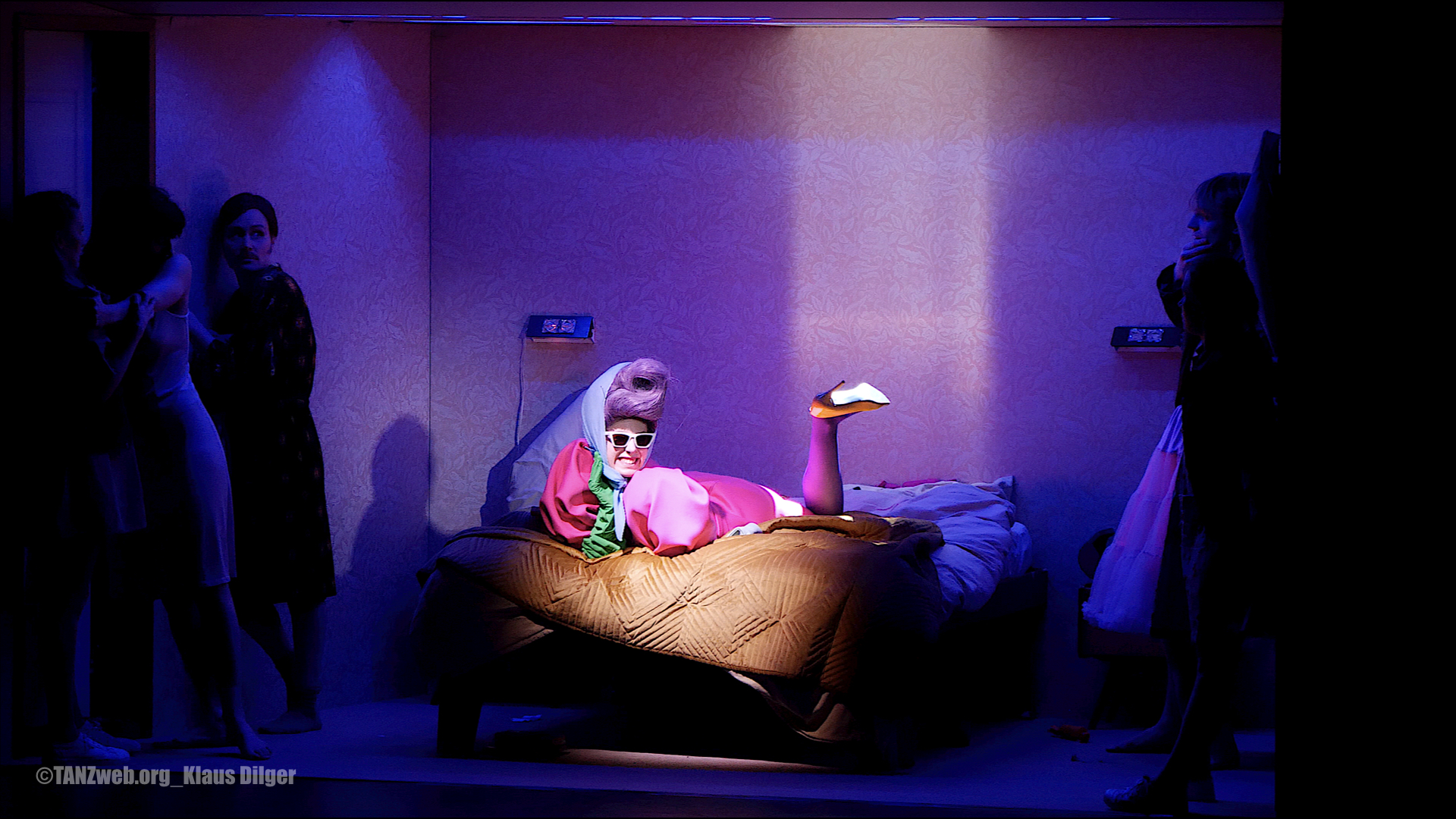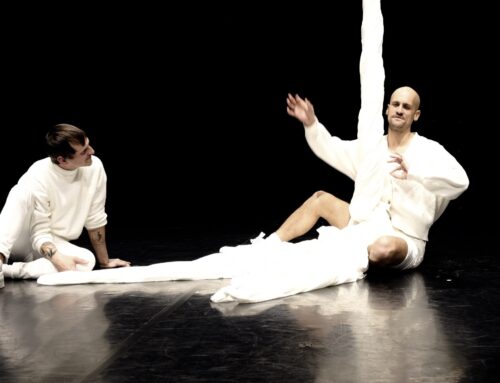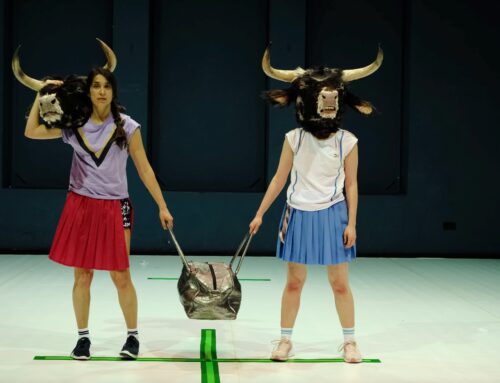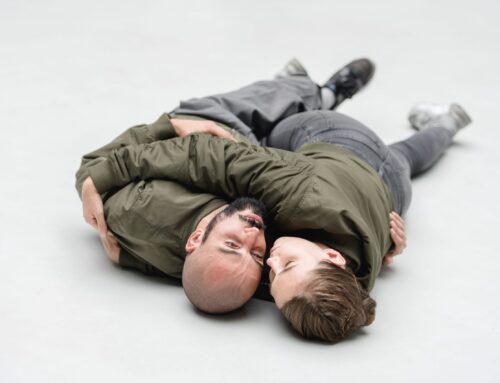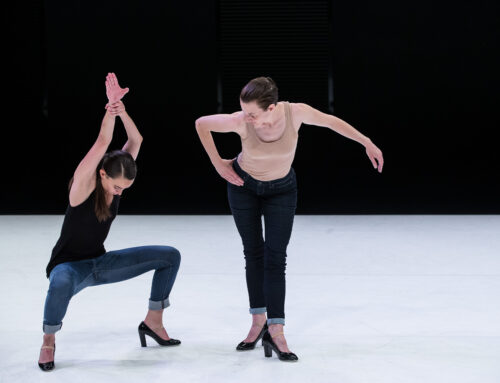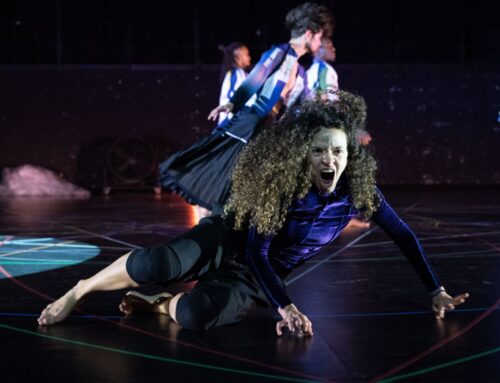schrit_tmacher opening in Kerkrade with Scapino Ballet
Departure into freedom
On the trail of truth: in „Pinocchio Effect“, Cecilia Moisio shows us the value of authenticity. With the Maas Theater en Dans and the Scapino Ballet, she encourages kids to be who they are, against all outside influence.
By: Harff-Peter Schönherr
Advertising with the „worst performance in the world“ is courageous. If you do something like that, you better be really good. If you’re not, no reviewer could wish for a better pitch: Whamm! Sunk!
Cecilia Moisio is brave. Alongside the Maas Theater en Dans and the Scapino Ballet, both from Rotterdam, the Netherlands, she takes multiple risks in „Pinocchio Effect“: shrill comedy interweaves with oppressive seriousness, acting, video, text and song almost marginalise the dance, yearning hopefulness clashes with nightmarish gloom, and although the target audience is children, adults should also question themselves.
The use of Carlo Collodi’s carved pinewood figure alone, which awakens to humanity and whose nose grows longer with every lie, requires self-confidence on the part of the director. Anyone familiar with Collodi’s figure expects a commentary on the highly questionable educational methods of the late 19th century, and this is not what Moisio is concerned with. Anyone unfamiliar with Collodi’s character, like many of the Tiktok and Fortnite generation at whom the production is aimed, may frown at the title.
However, anyone watching the 400 kids who will experience „Pinocchio Effect“ on 20 February at the Kerkrade Theatre in the Netherlands, attentive, engaged and fascinated, will quickly realise that none of this is a problem. Moisio’s plot is far enough removed from Collodi’s to not seem like a museum piece; moreover, education is often still as abusive today as it was back then. And the theme that Moisio deals with here in her usual psychological manner is as timeless as it is universal: the lie, as a „behaviour we all know“, the growing of the nose, serves as a symbol, as a symbol, for the consequences of guilt and self-deception, of unchallenged taboos, of toxic dominance.
It begins with a long table, microphones on it. Law after law is proclaimed, forcefully and demagogically. The ensemble, dressed in emphatically formal attire, displays cynicism, lust for power and coldness. Law 1 is of course: You must not lie! And then it gets more and more absurd. Law 10: Girls must always smile. Law 19: You must not think for yourself, an opinion different from ours causes confusion. Law 26: Children are not taken seriously.
The children in Kerkrade identify themselves immediately. Opposition erupts. They learn that only rebellion helps against manipulators.
The „Pinocchio Effect“ actually begins in the foyer. The supply lines under the ceiling are exposed here; some concrete structures, taken over from the old building during the modernisation, show their steel reinforcement as if in a wound. This signals: This is a place to look behind facades.
On the stage, a house, a flat is being built. Narrowness is communicated, petit bourgeoisie. We are in the 1950s, observing a family, the parents, their children. No one here who doesn’t put up facades, emotionally and intellectually. No one who hides wishes and dreams, no one who pretends realities that don’t apply to everyone. Imperceptibly, the building becomes more permeable, which we look into like a laboratory experiment in which the family is exemplary for society. People penetrate the walls and ceilings. Beneath them, masked, a warning figure of terror, perhaps it is death.
A downward spiral of all-round despair, deformation and agony begins. At the end, when everyone has aged and grown up, the walls and ceilings dissolve completely, all the furniture disappears and the agonising feast with which Moisio dismisses us is a battlefield on a bare stage.

